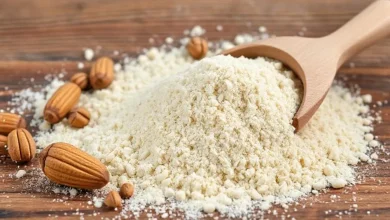Dried (Desiccated) Sweetened Shredded Coconut: Nutritional Information & Ingredient Profile
Overview:
Dried, sweetened, shredded coconut is a versatile ingredient commonly used in baking, cooking, and as a topping for various dishes. This coconut product retains the rich tropical flavor and texture of fresh coconut but comes in a more convenient, shelf-stable form. It is made by drying and shredding coconut meat and sweetening it to enhance its natural flavor, offering a delightful combination of sweetness and coconut aroma. While it is a popular addition to desserts like cakes, cookies, and bars, it can also be used in savory dishes like curries or sprinkled over yogurt and salads for added texture.
Nutritional Information (Per 100g):
| Nutrient | Amount |
|---|---|
| Energy | 501 kcal |
| Protein | 2.88 g |
| Total Fat | 35.49 g |
| Saturated Fat | 31.47 g |
| Carbohydrates | 47.67 g |
| Fiber | 4.5 g |
| Sugar | 43.17 g |
| Calcium | 15 mg |
| Iron | 1.92 mg |
| Magnesium | 50 mg |
| Phosphorus | 107 mg |
| Potassium | 337 mg |
| Sodium | 262 mg |
| Zinc | 1.82 mg |
| Copper | 0.313 mcg |
| Manganese | 2.475 mg |
| Selenium | 16.7 mcg |
| Vitamin C | 0.7 mg |
| Thiamin (Vitamin B1) | 0.031 mg |
| Riboflavin (Vitamin B2) | 0.02 mg |
| Niacin (Vitamin B3) | 0.474 mg |
| Vitamin B6 | 0.271 mg |
| Folate | 8 mcg |
| Vitamin B12 | 0 mcg |
| Vitamin A | 0 mcg |
| Vitamin E | 0.39 mg |
| Vitamin D2 | 0 mcg |
Allergen Information:
Shredded coconut contains tree nuts, and individuals with tree nut allergies should avoid consuming it. Additionally, many commercial varieties may contain added sugar and preservatives, so it is important to check labels for potential allergens or additional ingredients that might cause sensitivities.
Dietary Preferences:
- Gluten-Free: This product is naturally gluten-free and suitable for individuals with celiac disease or those avoiding gluten.
- Vegetarian and Vegan-Friendly: Sweetened shredded coconut is suitable for both vegetarian and vegan diets, provided there are no animal-based ingredients included in the processing (e.g., non-vegan sugars).
- Low in Protein: While it provides a small amount of protein (2.88 g per 100g), it is not a significant source of protein in the diet.
- High in Saturated Fat: Due to the naturally occurring fats in coconut meat, shredded coconut has a high saturated fat content. It should be consumed in moderation, especially by individuals on low-fat or heart-healthy diets.
- Sugar Content: The sweetened version of shredded coconut contains a relatively high amount of sugar (43.17 g per 100g). People with diabetes or those trying to limit their sugar intake should be cautious.
Nutritional Highlights:
- High in Healthy Fats: Sweetened shredded coconut is rich in fats, particularly saturated fats. While saturated fats have been linked to higher cholesterol levels in some studies, coconut oil’s unique medium-chain triglycerides (MCTs) may offer some health benefits, such as boosting metabolism and supporting weight loss.
- Fiber-Rich: With 4.5 grams of fiber per 100 grams, coconut provides a good source of dietary fiber, which can aid in digestive health and help maintain stable blood sugar levels.
- Rich in Minerals: Coconut is a good source of essential minerals, including magnesium (50 mg), potassium (337 mg), and phosphorus (107 mg). These nutrients play vital roles in bone health, electrolyte balance, and overall cellular function.
- Moderate Sugar Content: Though the product is sweetened, it provides a significant amount of sugar. For those monitoring sugar intake, opting for unsweetened versions or using this ingredient sparingly can help reduce overall sugar consumption.
Tips for Use:
- In Baking: Sweetened shredded coconut is an excellent addition to cakes, cookies, pies, and bars. Try adding it to chocolate chip cookies or coconut macaroons for a chewy texture and tropical flavor.
- In Breakfast Dishes: Sprinkle it over oatmeal, yogurt, or smoothie bowls for an added crunch and natural sweetness.
- In Savory Dishes: Use it to add texture and a mild coconut flavor to curries, stews, and salads. It pairs particularly well with tropical fruits like mango and pineapple, adding richness and texture.
- As a Snack: Sweetened shredded coconut can be enjoyed on its own as a satisfying, calorie-dense snack. However, be mindful of portion sizes due to its high-calorie content.
Conclusion:
Dried, sweetened shredded coconut is a versatile and flavorful ingredient that can elevate both sweet and savory dishes. Though it is calorie-dense and high in sugar, its high fat content—specifically healthy medium-chain triglycerides—offers potential health benefits when consumed in moderation. As a source of fiber and essential minerals like magnesium, potassium, and phosphorus, it can contribute to overall health when included as part of a balanced diet. Whether you use it in desserts or savory meals, shredded coconut provides a delightful tropical twist to your culinary creations.










